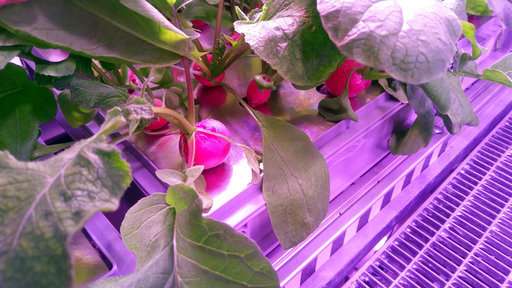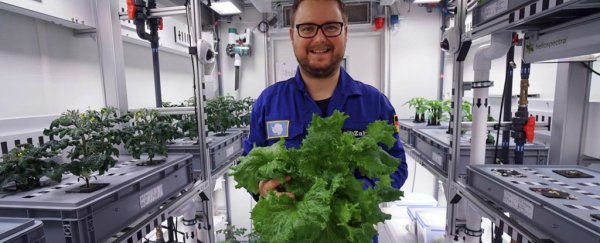If we're ever going to make the long trip to Mars and then colonise the place, we'll need a lot of food. If we can grow our own, even better.
In a step that's getting us closer to off-world farming, scientists on Germany's Neumayer Station III in Antarctica have just harvested a nice big crop of vegetables – a whole 3.6 kg (8 pounds) of salad greens, 18 cucumbers, and 70 radishes.
Even better, the crops, grown in a lab called EDEN-ISS, were produced without dirt, daylight, or pesticides, according to the team.
Instead, the researchers employed a reusable water cycle and a nutrient system, while optimising LED lighting and carefully monitoring carbon dioxide in the room - based on a method known as hydroponics.
"After sowing the seeds in mid-February, I had to deal with some unexpected problems, such as minor system failures and the strongest storm in more than a year," Paul Zabel, an engineer involved with the project, told dw.com.
"Fortunately, all these things could be fixed and overcome."
New day, fresh harvest. The first cucumbers #madeinantarctica from our #space greenhouse Eden-ISS! 😋 🤤 🥒🥒 pic.twitter.com/ptLLDam1ra
— DLR - English (@DLR_en) March 30, 2018
This is only the start of the harvest, too. The German Aerospace Centre, which coordinates the project, told AP that by May the scientists are hoping to harvest a huge 4-5 kilograms (9-11 pounds) of vegetables a week.
"I am an engineer, so first I had to gain a basic understanding of the plants to recognise whether they are flourishing early on," Zabel said back in 2016 – before the project got started.
This isn't the first time researchers have attempted something like this, with the ISS growing space vegetables already back in 2015.
But this project is focussed on producing a wider mix, such as radishes, salad greens, tomatoes, cucumbers, peppers (capsicum) and even herbs.
 Radishes grown in the greenhouse (DLR)
Radishes grown in the greenhouse (DLR)
All this in Antarctica, nonetheless. With temperatures outside dropping below -20 degrees Celsius (-4 degrees Fahrenheit), it's pretty amazing that the researchers are producing such a wide range of fruits and vegetables.
Now they're just waiting on some berries for dessert.
"You have to be patient when growing strawberries. Here we are still waiting for successful sowing," said project manager Daniel Schubert.
Watch this space.
